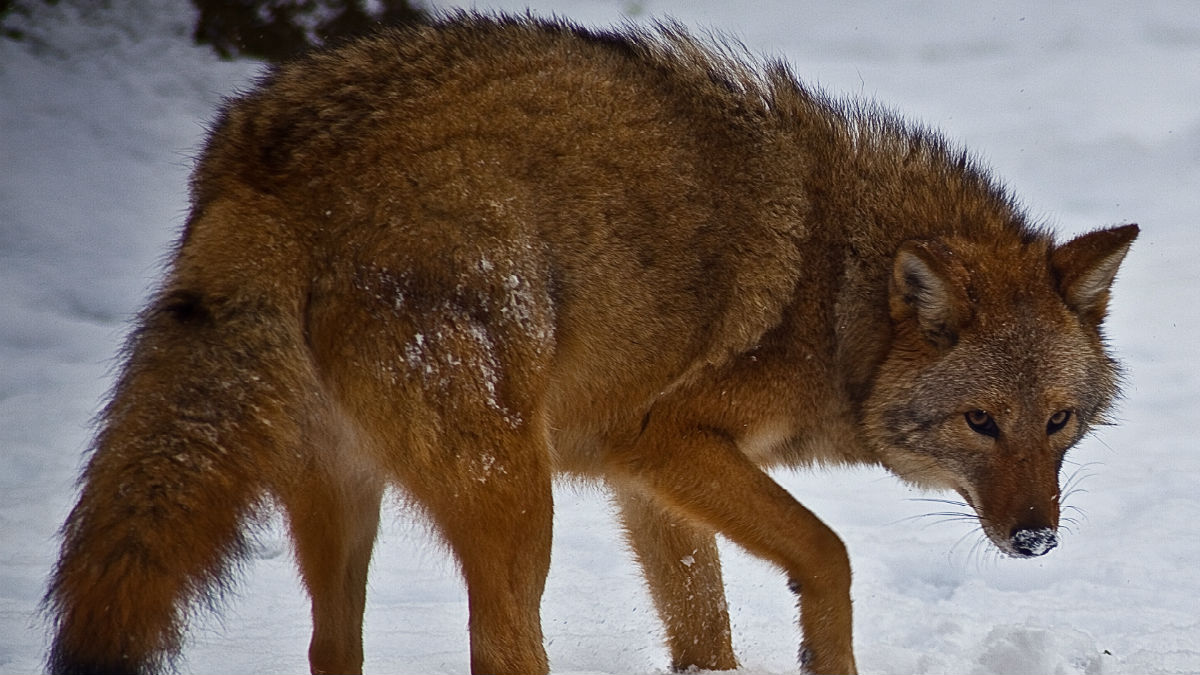Coywolf: what is the new coyote-wolf hybrid?
The new 'super predator' is experiencing a population explosion – but what is it and where did it come from?

A free daily email with the biggest news stories of the day – and the best features from TheWeek.com
You are now subscribed
Your newsletter sign-up was successful
It isn't often that scientists get to see evolution unfold right in front of their eyes. However, it appears that this phenomenon is occurring right now in North America.
Coywolves, a hybrid of coyotes and wolves, are currently experiencing a population boom. But what is causing them to succeed when wolf numbers are starting to dwindle?
Coywolves – what are they?
The Week
Escape your echo chamber. Get the facts behind the news, plus analysis from multiple perspectives.

Sign up for The Week's Free Newsletters
From our morning news briefing to a weekly Good News Newsletter, get the best of The Week delivered directly to your inbox.
From our morning news briefing to a weekly Good News Newsletter, get the best of The Week delivered directly to your inbox.
Coywolves are in fact a cross between wolves, coyotes and domestic dogs. The Latin name attributed to this breed is Canis latrans var.
Current estimates suggest there are around one million of them living in North America, but there is a dispute within the scientific community over whether coywolves are a wholly new species.
Where do they come from?
The coywolf was allegedly first seen in 1919, and according to scientists was probably a direct result of European settlement. Before that point, North America was dominated by wolves. Scientists now believe that forest clearing led to a dwindling of wolf numbers, while effectively encouraging coyotes, which live outside wooded areas. The gradual spread of farming brought dogs into the mix too.
A free daily email with the biggest news stories of the day – and the best features from TheWeek.com
What do they look like?
According to scientists, coywolves are lupine (i.e., wolfish) in appearance. Their genetic make-up is around 10 per cent dog and 25 per cent wolf; the rest is coyote.
Weighing around 25kg or more, coywolves are roughly twice the weight of purebred coyotes. With the addition of dog DNA, coywolves become more muscly with larger jaws and a quicker running speed.
Dr Roland Kays of North Carolina State University told The Economist that even the coywolves's howl was a product of the crossbreeding. The first part resembles the deep pitch of a wolf's howl, before developing into a "higher-pitched, coyote-like yipping".
Where do they hunt?
Apparently, wherever they want. While wolves prefer hunting in forests, and coyotes prefer open plains, the coywolf has evolved to hunt easily in either terrain. A lone coywolf is capable of tackling small deer, while packs have been known to kill a moose on successful hunts.
However, they aren't averse to urban environments either. Interbreeding has led coywolves to be more tolerant of humans and city noises.
Urban coywolves have been spotted in cities including Toronto, Chicago and New York, and – like foxes – they eat almost anything. They have developed nocturnal habits to keep as low a profile as possible.
Are they universally accepted as a 'new' species?
In a word, no. The Economist reports that an upcoming paper from Jonathan Way, an employee of the National Park Service in Massachusetts, suggests that it is a distinct species, but many disagree because of coywolves's willingness to continue to mate with other dogs, wolves, and coyotes.
Only time will tell if the coywolf is recognised as a new breed in its own right and it seems that a lot of the arguments will focus around semantics and definitions of 'species' rather than the coywolves themselves.
-
 The environmental cost of GLP-1s
The environmental cost of GLP-1sThe explainer Producing the drugs is a dirty process
-
 Greenland’s capital becomes ground zero for the country’s diplomatic straits
Greenland’s capital becomes ground zero for the country’s diplomatic straitsIN THE SPOTLIGHT A flurry of new consular activity in Nuuk shows how important Greenland has become to Europeans’ anxiety about American imperialism
-
 ‘This is something that happens all too often’
‘This is something that happens all too often’Instant Opinion Opinion, comment and editorials of the day
-
 Home Office worker accused of spiking mistress’s drink with abortion drug
Home Office worker accused of spiking mistress’s drink with abortion drugSpeed Read Darren Burke had failed to convince his girlfriend to terminate pregnancy
-
 In hock to Moscow: exploring Germany’s woeful energy policy
In hock to Moscow: exploring Germany’s woeful energy policySpeed Read Don’t expect Berlin to wean itself off Russian gas any time soon
-
 Were Covid restrictions dropped too soon?
Were Covid restrictions dropped too soon?Speed Read ‘Living with Covid’ is already proving problematic – just look at the travel chaos this week
-
 Inclusive Britain: a new strategy for tackling racism in the UK
Inclusive Britain: a new strategy for tackling racism in the UKSpeed Read Government has revealed action plan setting out 74 steps that ministers will take
-
 Sandy Hook families vs. Remington: a small victory over the gunmakers
Sandy Hook families vs. Remington: a small victory over the gunmakersSpeed Read Last week the families settled a lawsuit for $73m against the manufacturer
-
 Farmers vs. walkers: the battle over ‘Britain’s green and pleasant land’
Farmers vs. walkers: the battle over ‘Britain’s green and pleasant land’Speed Read Updated Countryside Code tells farmers: ‘be nice, say hello, share the space’
-
 Motherhood: why are we putting it off?
Motherhood: why are we putting it off?Speed Read Stats show around 50% of women in England and Wales now don’t have children by 30
-
 Anti-Semitism in America: a case of double standards?
Anti-Semitism in America: a case of double standards?Speed Read Officials were strikingly reluctant to link Texas synagogue attack to anti-Semitism